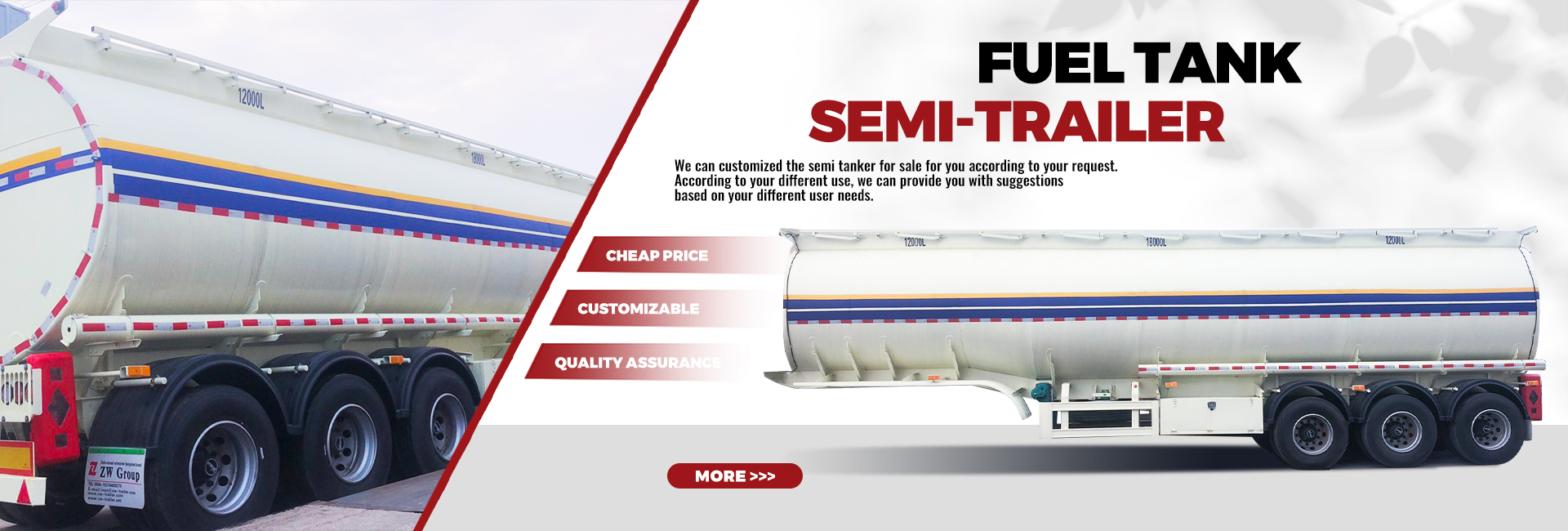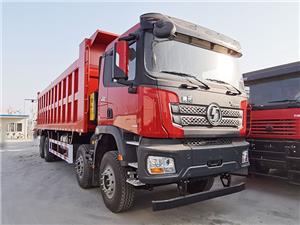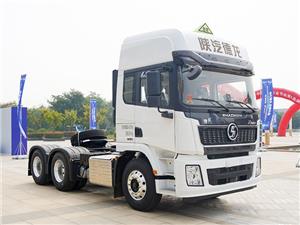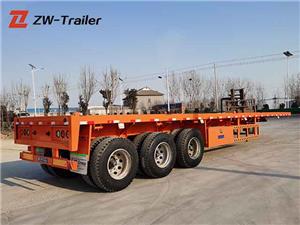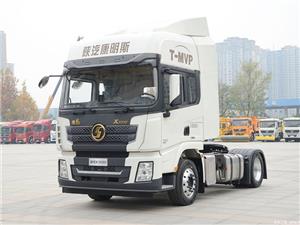Stainless Steel Tanker Trailer Vs. Aluminum Tanker Semi Trailer
Stainless Steel Tanker Trailer vs. Aluminum Tanker Semi Trailer:
Which One Is Right for You?
By ZW Group – Reliable Manufacturer of Tanker Semi Trailers
In the logistics and transport industry, choosing the right liquid tanker semi trailer is essential for efficiency, safety, and durability. At ZW Group, we manufacture and supply high-quality Stainless Steel Tanker Trailers and Aluminum Tanker Semi Trailers designed for various industries and geographic markets, including Africa.
In this article, we’ll explore the key differences between stainless steel and aluminum tankers, their respective benefits and drawbacks, common transport applications, guidance for buyers, maintenance tips, market suitability across African countries, and frequently asked questions.
1. Material Comparison: Stainless Steel vs. Aluminum
Stainless Steel Tanker Trailer
Advantages:
Excellent corrosion resistance, especially for transporting corrosive liquids.
High durability and strength, ideal for long-term heavy-duty use.
Suitable for hot and cold liquids.
Easier to clean and sanitize, meeting food-grade transport standards.
Disadvantages:
Heavier than aluminum, reducing payload capacity.
Higher cost due to material and fabrication.
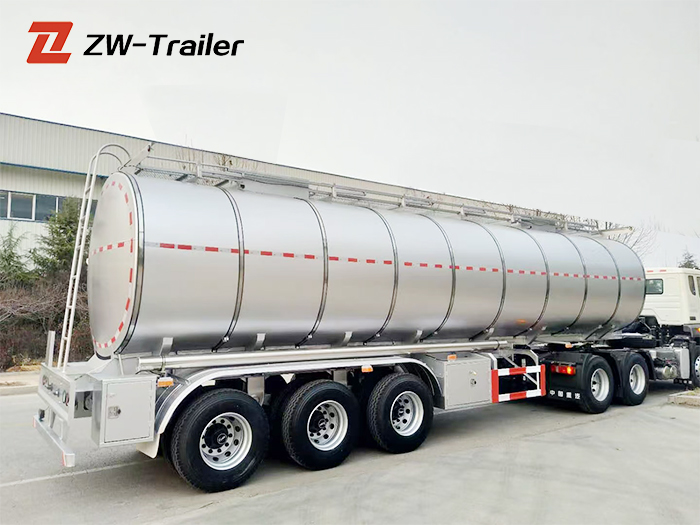
Stainless Steel Tanker Trailer for sale Zimbabwe
Aluminum Tanker Semi Trailer
Advantages:
Lighter weight, increasing fuel efficiency and payload.
Lower material cost, making it more budget-friendly.
Good resistance to non-corrosive chemicals like fuel or edible oils.
Disadvantages:
Less durable in harsh environments or with corrosive substances.
More susceptible to dents and deformation under impact.
Not suitable for acidic or alkaline liquids.
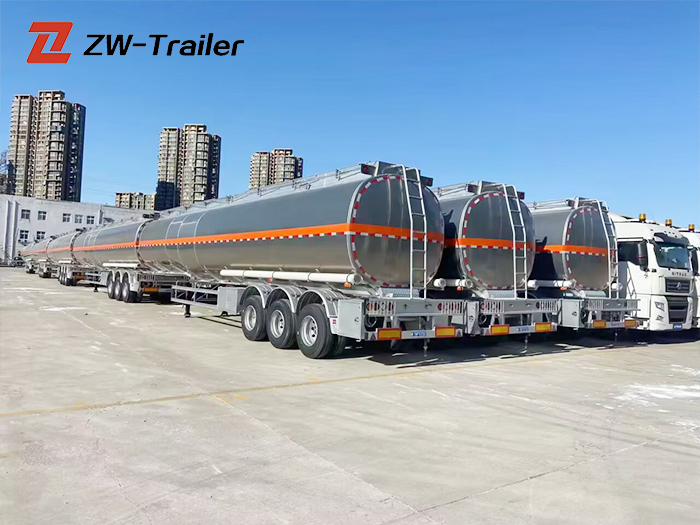
Aluminum Tanker Semi Trailer for sale Tanzania
2. Applications by Substance
| Substance Type | Recommended Trailer |
| Milk, Water, Juice | Stainless Steel (Food Grade) |
| Fuel, Gasoline, Diesel | Aluminum (Lightweight & Efficient) |
| Acid, Alkali Chemicals | Stainless Steel (Corrosion Resistant) |
| Edible Oils | Aluminum or Stainless Steel |
| Liquid Fertilizer | Stainless Steel |
3. Buyer Guide: How to Liquid Choose Tanker Trailer?
When deciding between a stainless steel and aluminum tanker trailer, consider the following:
Type of Liquid: Corrosive? Food-grade? Flammable?
Budget: Aluminum is cheaper, but stainless steel lasts longer.
Payload Requirements: Aluminum allows for a higher payload.
Environmental Conditions: For humid or coastal areas, stainless steel offers better longevity.
Maintenance Capability: Stainless steel is easier to maintain but costlier to repair.
4. How to Maintenance & Care Tips about Tanker Trailer?
To ensure the longevity and performance of your ZW Group tanker trailer:
For Stainless Steel Tanker Trailers:
Regular Cleaning: Though corrosion-resistant, regular cleaning prevents build-up of residues that could lead to pitting or crevice corrosion. Use appropriate cleaning agents.
Inspection for Damage: Periodically check for dents, cracks, or signs of stress, especially around welds and structural points.
Valve and Seal Inspection: Ensure all valves and seals are in good working order to prevent leaks.
Rust Prevention (for minor scratches): While stainless steel resists rust, deep scratches can expose the underlying metal. Promptly address any deep scratches.
For Aluminum Tanker Semi-Trailers:
Gentle Cleaning: Use non-abrasive cleaners to avoid scratching the surface.
Fatigue Crack Inspection: Regularly inspect for hairline cracks, especially in high-stress areas like frame connections and around manholes. Aluminum is more prone to fatigue.
Corrosion Protection: While aluminum forms a protective oxide layer, certain chemicals or environments can still cause corrosion. Ensure proper cleaning and avoid prolonged contact with incompatible substances.
Repair promptly: Any dents or damage should be repaired quickly to prevent further structural weakening.
For both types, adhere to the manufacturer's ZW Group recommended maintenance schedule, including tire pressure checks, brake inspections, and suspension system maintenance.
5. Suitable African Markets
ZW Group's tankers are built to withstand diverse terrain and climate conditions. Popular export destinations include:
Nigeria – Fuel, edible oil, and chemical transport.
Kenya – Food-grade liquids like milk and water.
Tanzania – Petroleum and industrial chemicals.
Ghana – Agricultural liquid fertilizers.
Ethiopia – Safe water and dairy transport.
6. Frequently Asked Questions (FAQ)
Q1: Which is better for fuel transport—aluminum or stainless steel?
A: Aluminum is commonly used for fuel due to its light weight and cost-efficiency.
Q2: Can aluminum tankers carry acidic liquids?
A: No, aluminum is not suitable for corrosive liquids. Choose stainless steel.
Q3: How long do ZW Group stainless steel tankers last?
A: With proper maintenance, up to 15–20 years of service life.
Q4: Are your trailers customizable?
A: Yes, ZW Group offers custom tank volume, compartments, insulation, and lining options.
Q5: What certifications do your trailers have?
A: All ZW tankers meet ISO, CE, and relevant ADR standards for transport safety.

Both stainless steel and aluminum tanker trailers from ZW Group offer unique advantages depending on your specific transport needs. While aluminum is lightweight and fuel-efficient, stainless steel offers superior corrosion resistance and durability for challenging cargo.
Looking to purchase a high-quality liquid tanker trailer for your operations in Africa or abroad?
Contact ZW Group today for expert consultation and competitive factory pricing.

